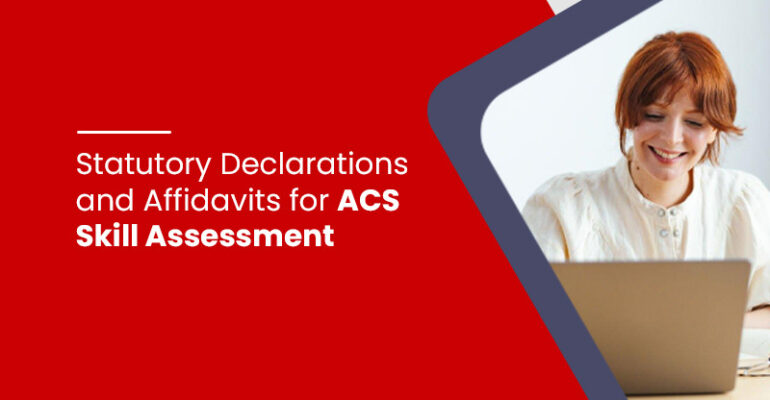Statutory Declarations and Affidavits for ACS Skill Assessment

Statutory Declarations and Affidavits for ACS Skill Assessment
A Statutory Declaration or Affidavit can be used in place of an employment reference letter. It is a legally binding written statement that is signed in the presence of an authorized witness.
Submitting the required supporting documents is essential when applying for an Australian Computer Society (ACS) skill assessment. Among these documents, a Statutory Declaration or Affidavit holds significant importance.
This blog post will delve into the significance of Statutory Declarations and Affidavits in the ACS skill assessment process. We’ll provide a comprehensive guide on preparing these documents effectively to maximize your chances of a successful assessment outcome.
1. Understanding the ACS Skill Assessment Process
a. Overview of the ACS Skill Assessment Process
The ACS skill assessment evaluates candidates’ qualifications and work experience to determine their suitability for skilled migration or professional development in Australia. The process typically involves the following key stages:
- Application submission: Candidates submit their applications and the necessary supporting documents.
- Document verification: ACS verifies the authenticity and relevance of the submitted documents.
- Skills assessment: A thorough assessment of candidates’ qualifications, employment history, and skillset is conducted.
- Outcome notification: Candidates are informed of the assessment outcome, which determines their eligibility for migration or professional recognition.
b. Importance of submitting accurate and relevant supporting documents
Accurate and relevant supporting documents are vital for a successful ACS skill assessment. Here’s why:
- Credibility: Submitting accurate documents showcases your credibility and strengthens your application.
- Eligibility determination: ACS relies on supporting documents to accurately assess your qualifications and work experience.
- Assessment accuracy: Relevant documents comprehensively describe your skills and expertise, ensuring a more accurate assessment outcome.
- Meeting requirements: Carefully reviewing and submitting the required documents helps you meet ACS guidelines, preventing unnecessary delays or rejections.
To achieve assessment success, consider the following tips when submitting supporting documents:
- Thoroughness: Ensure all relevant documents, such as academic transcripts, employment references, and professional certifications, are included.
- Accuracy: Double-check the accuracy of the information provided in the documents to avoid discrepancies or errors.
- Relevance: Include documents that directly align with the ACS skill assessment criteria, focusing on qualifications and experience relevant to your nominated occupation.
2. What is a Statutory Declaration for ACS Skill Assessment?

A statutory declaration for ACS (Australian Computer Society) skill assessment is a written statement made by an individual supporting their skill assessment application. The ACS skill assessment is a requirement for individuals seeking to migrate to Australia or obtain employment in the country’s ICT (Information and Communication Technology) industry.
A statutory declaration is an alternative to an employment reference letter when an applicant cannot obtain one from their previous employer or does not meet ACS requirements.
a. Purpose of Statutory Declarations in immigration and employment
In the immigration and employment contexts, statutory declarations are crucial in supporting individuals’ applications and providing necessary information. Specifically for ACS skill assessment, a statutory declaration is a formal written statement by the applicant to outline their employment history, roles, responsibilities, and skills in the ICT field. It helps verify their work experience and ensure compliance with ACS assessment criteria.
A statutory declaration for ACS skill assessment provides an alternative means for applicants to demonstrate their ICT-related work experience when an employment reference letter is unavailable or does not meet ACS requirements. It allows individuals to present their skills and abilities in a legally recognized manner, thereby assisting in assessing their suitability for migration or employment in Australia’s ICT industry.
b. Differentiating Statutory Declarations from other forms of written statements
Statutory declarations differ from written statement forms due to their specific legal significance and requirements. Unlike a simple statement or self-declaration, a statutory declaration is a formal document that holds legal weight when signed in the presence of an authorized witness. It requires the applicant to make a solemn declaration affirming the truthfulness and accuracy of the information provided.
Compared to an employment reference letter, typically issued by the applicant’s employer, a statutory declaration is a self-declaration made by the applicant. It allows them to present their skills, work experience, and relevant information without relying solely on an external source. This distinguishes a statutory declaration as a more direct and personal means of conveying their abilities and expertise.
c. Common usage scenarios for Statutory Declarations
Statutory declarations for ACS skill assessment are commonly used in the following scenarios:
- Lack of Employment Reference Letter: When an applicant cannot obtain an employment reference letter from their previous employer, whether due to non-cooperation, company closure, or other reasons, they can use a statutory declaration to substantiate their work experience.
- Insufficient Employment Reference Letter: If an employment reference letter obtained does not meet ACS requirements, such as needing more detailed information or not being issued on company letterhead, a statutory declaration can be utilized to provide additional evidence and complete the assessment criteria.
- Independent Contractors or Self-Employed Individuals: Obtaining a formal employment reference letter may not be possible for individuals who have worked as independent contractors or have been self-employed. In such cases, a statutory declaration can be an appropriate alternative to demonstrate their skills and experience.
By utilizing a statutory declaration, applicants can fulfill ACS skill assessment requirements, provide comprehensive information about their work experience, and strengthen their case for migration or employment in Australia’s ICT industry.
3. Role of Affidavits in ACS Skill Assessment
Affidavits are vital in the ACS skill assessment process, providing crucial evidence and support for applicants. They are legally binding written statements signed by an authorized witness to validate specific claims and circumstances.
Affidavits provide applicants with additional information or substantiate their skills and experience when traditional documentation, such as employment reference letters, is unavailable or insufficient.
a. Significance of Affidavits in the ACS Skill Assessment process
Affidavits are significant in the ACS skill assessment process, as they allow applicants to present evidence and support claims that other forms of documentation may not adequately cover.
They are particularly valuable when applicants need to demonstrate specialized skills, experience in niche industries, or work performed in unique circumstances. Affidavits provide a legally recognized means of validating these claims, enhancing the credibility and strength of the ACS skill assessment application.
Read More: What are the documents required for CDR Report Writing? 💪💪
b. Instances where an Affidavit may be required for specific claims or circumstances.
There are instances where an affidavit may be required to support specific claims or circumstances in the ACS skill assessment. For example, if an applicant has worked in a non-conventional employment arrangement, such as freelance or contract work, an affidavit can provide evidence of their roles, responsibilities, and achievements.
Similarly, for applicants who have experienced challenges in obtaining employment reference letters, an affidavit can serve as an alternative means to showcase their skills and experience. In cases where applicants need to explain gaps in employment history or address discrepancies, an affidavit can provide a clear and valid explanation.
c. Contrasting features of Statutory Declarations and Affidavits
Statutory declarations and affidavits have distinct features that set them apart. While both are legally binding written statements, affidavits typically require sworn oaths and may involve more formal procedures, such as notarization.
On the other hand, statutory declarations are often used as an alternative to specific documents, such as employment reference letters, and may not require an oath or notarization. Understanding the requirements and guidelines the ACS sets for the skill assessment process is essential to determining whether a statutory declaration or an affidavit is more appropriate for the circumstances.
4. Preparing a Statutory Declaration for ACS Skill Assessment
A well-prepared statutory declaration can significantly enhance the credibility and strength of the application. Preparing a statutory declaration for ACS skill assessment requires careful attention to detail and adherence to ACS guidelines. Follow this step-by-step guide to ensure a comprehensive and accurate statutory declaration.
a. Step-by-step guide on preparing a Statutory Declaration
- Introduce yourself: Include your full name, contact details, and identification numbers required by the ACS.
- Provide personal information: Include your date of birth, nationality, and current residential address.
- Outline your employment history: Detail your previous work experience, including the company name, job title, employment duration, and a brief description of your roles and responsibilities.
- Highlight relevant qualifications: Mention any degrees, certifications, or relevant educational qualifications you have obtained.
- Explain any gaps in employment: If there are gaps in your employment history, explain each gap clearly.
- Include supporting evidence: If available, attach supporting documents such as pay slips, tax reports, or bank statements that validate your employment and work experience.
b. Including necessary details
When preparing a statutory declaration for the ACS skill assessment, it is crucial to include all necessary details. This includes personal information such as your full name, contact details, and identification numbers.
Provide a comprehensive employment history, including company names, job titles, employment durations, and a clear description of your roles and responsibilities. Include relevant qualifications, degrees, certifications, or educational achievements that showcase your skills and expertise.
Learn More: How to write a perfect CV for Engineers Australia? 🗎🗎
c. Tips for accuracy, completeness, and compliance with ACS guidelines
To ensure accuracy, completeness, and compliance with ACS guidelines, consider the following tips:
- Thoroughly review the ACS guidelines: Familiarize yourself with the specific requirements and guidelines set by the ACS for the skill assessment process.
- Double-check all information: Ensure that all personal details, employment history, and qualifications are accurate and up-to-date.
- Be concise yet comprehensive: Provide sufficient details to showcase your skills and experience without unnecessary embellishments or excessive length.
- Seek professional assistance if needed: If you are unsure about preparing the statutory declaration, consider seeking guidance from a professional, such as an immigration consultant or a lawyer experienced in ACS skill assessments.
By following these steps and tips, you can prepare a well-crafted and accurate statutory declaration for ACS skill assessment, increasing the chances of a successful application.
5. Crafting an effective Affidavit for ACS Skill Assessment
Crafting an effective affidavit for ACS skill assessment is crucial to present a strong case for your application. An affidavit is a legally binding written statement supporting specific claims and circumstances. By following these guidelines, you can create an impactful affidavit that enhances the credibility of your ACS skill assessment.
a. When is an Affidavit necessary instead of a Statutory Declaration?
Affidavits are typically required when providing detailed and sworn evidence to support specific claims or circumstances. An affidavit is appropriate if you need to present more formal and legally binding documentation.
Read More: ACS Assessment pathways for Skilled Migration. 💡💡
b. Legal requirements for creating a valid affidavit
When creating an affidavit for ACS skill assessment, ensure that it meets the legal requirements to be considered valid. These requirements may vary by jurisdiction, but generally, an affidavit should include:
- Heading indicating it is an affidavit.
- Statement of truthfulness, typically starting with “I solemnly declare” or “I swear,” followed by your name.
- Signature and date, ideally witnessed by an authorized person.
- Clear identification of the person making the affidavit.
- Sequential numbering of the paragraphs.
- Facts are presented in a clear, concise, and organized manner.
c. Guidelines for drafting a persuasive and Impactful Affidavit to support claims
To draft a persuasive and impactful affidavit for ACS skill assessment, consider the following guidelines:
- Begin with a clear introduction: Introduce yourself, state your qualifications, and briefly explain the purpose of the affidavit.
- Present facts and evidence: Clearly state the specific claims or circumstances you are addressing and provide supporting evidence, such as employment contracts, letters, or official documents.
- Organize information logically: Structure your affidavit into paragraphs addressing a specific point or claim. Use headings or subheadings for clarity.
- Be concise and precise: Present information clearly and concisely, avoiding unnecessary details or opinions. Focus on relevant facts that directly support your claims.
- Use a professional tone: Maintain a formal and professional tone throughout the affidavit, ensuring clarity and accuracy in your language.
- Seek legal advice if needed: If you have any doubts or questions about the legal aspects of creating an affidavit, it’s advisable to consult with a legal professional experienced in ACS skill assessments.
Following these guidelines, you can craft an effective affidavit that persuasively supports your claims and strengthens your ACS skill assessment application.
Learn More: Complete guide to Master the VETASSESS Skill Assessment. 🔥🔥
Unsuitable Assessment of Statutory Declarations or Affidavits

The assessment of statutory declarations or affidavits can be deemed unsuitable if the applicant fails to provide appropriate proof of paid employment. It is important to note that cash payments, employment contracts, appointment letters, or position descriptions will NOT be accepted as supporting evidence.
Acceptance of statutory declarations or affidavits in place of job references is subject to review and discretion by the ACS. It is worth mentioning that these documents will be carefully scrutinized for authentication against fraud and plagiarism by the Department of Home Affairs.
Points to Know for Unsuitable Statutory Declarations or Affidavits
To avoid submitting unsuitable statutory declarations, consider the following points:
- Declarations from a junior colleague will not be considered suitable evidence.
- Merely stating that the referee agrees with what the requestor wrote in another document needs to be revised.
- The stamp and signature of a Notary Public do not prove that the referee’s signature has been witnessed.
- A signature of a Notary Public only indicates that the document is an attested copy, not that the referee’s signature has been witnessed.
- Declarations not witnessed on the same day will be deemed unsuitable.
- Directly copying and pasting duties from the Australian and New Zealand Standard Classification of Occupations (ANZSCO) will not be accepted as valid evidence.
- By being aware of these points and ensuring that your statutory declarations or affidavits meet the appropriate criteria, you can enhance the suitability and credibility of your ACS skill assessment application.
Conclusion
When applying for an ACS skill assessment, meticulously preparing accurate and well-documented statements, such as Statutory Declarations and Affidavits, significantly impacts your application’s credibility. By following the guidelines presented in this blog post, you can maximize your chances of success.
Remember to carefully review the ACS guidelines and consider seeking professional advice for accurate and effective preparation of your Statutory Declaration or Affidavit. If you need assistance preparing your CDR report, RPL report, employment reference letter, and associated documents consider us for free career advice and guidance.

